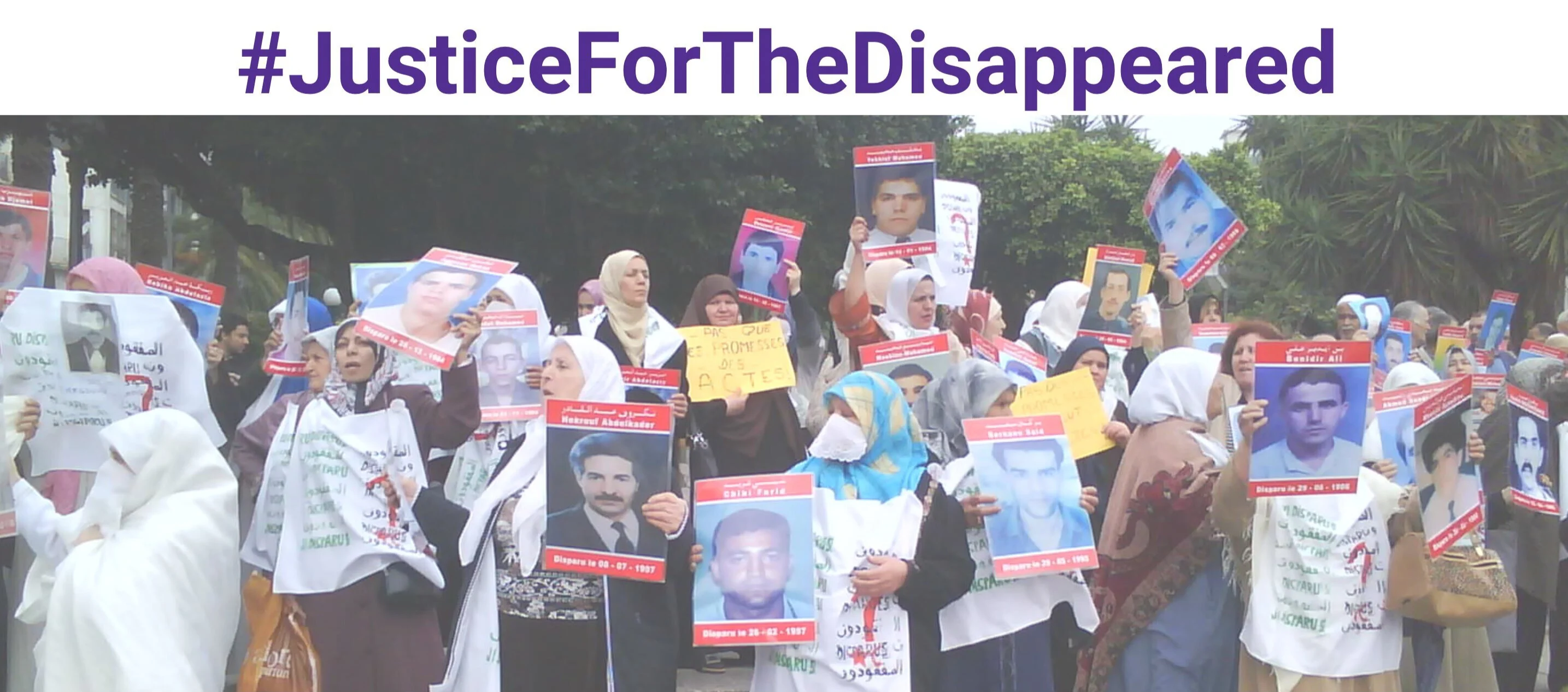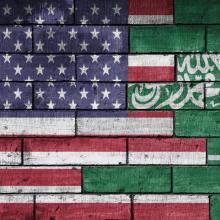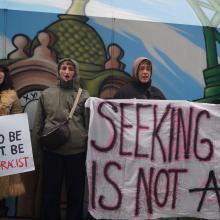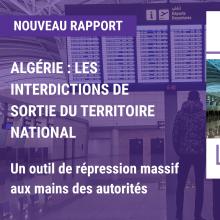October 03, 2023

© Courtesy of the Truth and Justice for the Disappeared.
"Neither among the living, nor among the dead: where are they?" - Mother of a disappeared
This 29 September 2023 marks the eighteenth year since the adoption by referendum of the so called Charter for Peace and National Reconciliation, an amnesty law representing the natural completion of the process of impunity that began following the events of the 1990s in Algeria.
The conflict of the 1990s and the systematic practise of enforced disappearances
Between 1992 and 1998, Algerians found themselves caught in the middle of a bloody conflict between Islamist groups and state authorities, which has, amongst various human rights violations, led to the systematic practice of enforced disappearances conducted by both sides. To date, Algerian and international civil society organisations have identified between 10,000 and 20,000 cases of enforced disappearances[i], the majority of which involve arbitrary arrest and detention, accompanied by acts of torture, inhuman treatment, sexual violence, and extrajudicial executions. Enforced disappearances are conducted in an extra-judicial manner rendering victims vulnerable to human rights violations outside of the protection of the law. The families who have been, and are still waiting for information of the fate of their loved one(s), are also victims of a prolonged torture.
The Charter as a guarantee of jurisdictional immunity
While enforced disappearance is condemned by international law and constitutes a crime against humanity when it is practiced systematically and widely, as was the case during the 1990s, the Algerian state’s response since the end of the civil war reflects the determination of covering up the crimes of the past in a so-called agenda of reconciliation and national unity. This process guarantees jurisdictional immunity for all perpetrators of serious human rights violations in Algeria.
Indeed, as early as 1999, the promulgation of the Civil Concord Act granted exemptions and reduced penalties for those involved in acts of terrorism[ii]. In 2000, the benefits of this law were extended by decree to the armed groups of the Islamic Salvation Army[iii]. With the adoption of the Charter in 2005, accompanied by four implementing texts that came into force in 2006, immunity is also granted to public officials who have committed reprehensible acts to protect the security of property, individuals, institutions, and the Nation[iv]. This measure is completely contrary to Algeria's obligations under international law. According to the Human Rights Committee[v], States parties cannot exonerate perpetrators of enforced disappearance of their personal responsibility by adopting amnesty laws.
A process that denies families’ access to truth and justice
To this day, the legal arsenal put in place by the Algerian State has deprived the relatives of victims of enforced disappearances of fundamental rights enshrined in the Algerian Constitution and international treaties such as the International Covenant on Civil and Political Rights.
Firstly, the Charter reinforces impunity by organising the compensation scheme[vi], which requires the families of victims to submit a death certificate. This is a particularly inhumane scheme for families, who are often forced by their social, material and financial situation since the disappearance of their loved one to agree to this scheme. As a result, the families who have taken this step find themselves in a state of total disarray, having the impression of betraying the memory of their disappeared relative, and betraying themselves in their quest for the truth. The Committee against Torture considers that subjecting compensation to the establishment of a death decree may "constitute a form of inhuman and degrading treatment"[vii].
Families who refuse to comply with this procedure are harassed by the authorities, who threaten them by insisting that "it's the law», or receive a formal notice ordering them to go to the Wilaya to initiate the process, and summons them to appear before the family court. And, when families persist and refuse to collect their compensation, the Public Prosecutor's Office can issue a death decree on its own initiative without the consent of the families.
Furthermore, this compensation is merely a form of financial reparation, which is by no means adequate nor appropriate. First, the calculation and payment are not determined according to the harm suffered by the victims, in such a manner that this system is more akin to a reversion of the salaries and retirement pensions relating to the disappeared. Secondly, this compensation does not provide full reparation, as it is not preceded by any investigation to establish the fate of the disappeared person.
A law that violates the fundamental rights of families and activists
The measures implemented by this amnesty law are reinforced by a clear ban on the enjoyment and exercise of freedom of expression. The Charter endorses an official national version of history, which not only covers up part of the memory of the conflict, but also directly threatens[viii] anyone wishing to publicly denounce human rights violations or initiate a debate on the subject, with the risk of a prison sentence of 3 to 5 years.
As a result, any complaint lodged against state agents for enforced disappearance is declared inadmissible, journalists are forced into self-censorship, and gatherings of families and human rights defenders to organise the fight against impunity are often violently repressed.
These acts of repression instituted by the 2005 Charter echo the current human rights situation in Algeria, where activists, media and other members of civil society are constantly harassed and imprisoned by the judicial authorities. As Clément Voule, Special Rapporteur on the rights to freedom of peaceful assembly and freedom of association, stated on 26 September, the Algerian authorities must take all appropriate and necessary measures to open civic space so that Algeria can move forward.
The same applies to the Charter for Peace and National Reconciliation: if we want to overcome the divisions within Algerian society, the State must put in place mechanisms to shed light on the fate of the disappeared and guarantee access to justice and fair reparation for the victims. This presupposes the repeal of such restrictive laws and the restoration of the necessary space for criticism to civil society so that all memories can be expressed and coexist.
Recommendations to the Algerian State
Since enforced disappearance constitutes a crime against humanity for which there is no statute of limitations in the context of the 1990s in Algeria, its perpetrators must not be able to benefit from amnesties[ix].
In this respect, the Charter and its application texts cannot determine the definitive settlement of the issue of the 'disappeared' in Algeria.
For a Charter for Truth, Peace and Justice :
1) The search for Truth
a-. Any information gathered in a judicial or other context relating to the fate of a disappeared person must immediately be the subject of a full and impartial investigation. If alive, the victim must be handed over to the protection of the law, and if not, their remains must be returned to their family. All victims of enforced disappearance must have access to the final results of the investigation.
b-. The competent public authorities must use all technical and legal means to locate mass graves and unmarked graves, identify the bodies, clarify the circumstances in which the bodies were buried and return the remains to the families. These investigations will also involve relevant archival work and the gathering of testimonies from the security services, members of Islamist groups who have laid down their arms, health personnel and the courts.
c-. The state authorities must set up a database collecting DNA identification of family members of the disappeared on a voluntary basis, and seek to update it constantly by cross-referencing new information with new technologies.
2) Refusing impunity
d-. The competent authorities must systematically carry out immediate and impartial investigations into each alleged case of disappearance in which the instigator, perpetrator or accomplice is said to be a public official or affiliated.
e-. Any criminal complaint against a person unknown or a public official must be declared admissible and be investigated immediately in order to identify those responsible and their accomplices. f-. The State must immediately take measures to guarantee the independence and impartiality of the judiciary in Algeria, which is a sine qua non for the appropriate handling of cases and the appropriate functioning of judicial mechanisms to allow the perpetrators of enforced disappearances to be brought to justice and to guarantee reparations to the victims.
3)Implementation of appropriate and adequate remedies
g-. The State must guarantee the fullest possible reparation, including appropriate financial compensation and moral and psychological rehabilitation for victims.
4) Guarantees of non-repetition
h-. The State must respect, protect, guarantee, and promote the freedoms of opinion, expression, association, assembly, and peaceful assembly of those who demand truth and justice in relation to enforced disappearances and in general.
i-. The State must protect all victims and their families against potential attacks on their physical and moral integrity that they may suffer as a result of their grievances.
j-. The State must initiate a process of remembrance that is as exhaustive, inclusive and visible as possible.
Signatory organisations:
The Collectif des Familles de Disparu.e.s en Algérie (CFDA) is an association founded in 1998, whose aim is to shed light on the fate of the disappeared in Algeria since the 1990s, to support the victims of enforced disappearance and their relatives in their quest for the truth and access to justice and reparation, and to fight against the impunity that the perpetrators of this crime have enjoyed for nearly thirty years. The CFDA won the Special Mention of the Human Rights Prize of the French Republic and the Human Rights Prize of the Catalan Institute for Peace (ICIP).
● Association Djazaïrouna des Familles Victimes du Terrorisme Islamiste
● Association des parents et amis de disparus au Maroc (APADM)
● Association Ex-Prisonniers politiques chiliens en France
● Association ¿Dónde Están? – Où sont-il ?
● Associations Anyakayder et Mebyader
● Cairo Institute for Human Rights (CIHRS) / Institut du Caire pour les Etudes des Droits de مركز القاهرة لدراسات حقوق اإلنسان / (ICEDH (Homme’l
● Comité pour le respect des libertés et des droits de l’homme en Tunisie (CRLDHT) ● Comité de sauvegarde de la Ligue Algérienne des Droits de l’Homme
● Comité de coordination des familles des disparus et des victimes de la disparition forcée au Maroc
● Euromed Droits
● Fédération internationale pour les droits humains (FIDH)
● Fédération Euro-Méditerranéenne contre les disparitions forcées (FEMED)
● Fédération des Tunisiens Citoyens des deux Rives (FTCR)
● Ligue des droits de l’homme (LDH)
● MENA Rights Group
● Organisation Marocaine des Droits de l’Homme (OMDH)
● Réseau Euromed des ONG Maroc
● Riposte Internationale (RI)
مؤسسة بالدي لحقوق الانسان ●
Signatory members of civil society:
● Aissa Rahmoune, vice-president of the Fédération internationale pour les droits humains (FIDH) and coordinator of the Comité de sauvegarde de la LADDH
● Abdelhak El Ouassouli, member of the Comité de coordination des familles des disparus et des victimes de la disparition forcée au Maroc
● Ali Aitdjoudi, president of Riposte Internationale (RI)
● Cherguit Djegdijga, mother of a disappeared in Algeria
● Dalel Aidoun, lawyer at SOS Disparus
● Dalila Abdellaoui, sister of a disappeared in Algeria
● Elena Salgueiro, president of the organisation ¿Dónde Están?
● Family Ouzzame, victims of enforced disappearance in Morocco
● Fatma Zohra Boucherf, mother of a disappeared in Algeria
● Fatma Zohra Kheddar, Secretary General of the organisation Djazaïrouna des Familles Victimes du Terrorisme Islamiste
● Fatima Lakhel, spouse of a disappeared in Algeria
● Lila Mokri, journalist and editor in chief
● Mouhieddine Cherbib, FTCR et CRLDHT
● Naoufal Bouamri, lawyer in Morocco
● Nedjma Benaziza, grand-daughter of a disappeared in Algeria
● Nesroulah Yous, uncle of a disappeared in Algeria and human rights defender
● Ouahiba Aidaoui, sister of a disappeared in Algeria
● Rachid El Manouzi, former disappeared and brother of a disappeared president of l’Association des parents et amis de disparus au Maroc, et secrétaire général de la FEMED
● Wadih Al Asmar, president of Euromed Rights
[i] « Les disparitions forcées en Algérie : un crime contre l’humanité », Rapport du Collectif des Familles de Disparu.e.s en Algérie, 2016.
[ii] Ibid.
[iii] Ibid.
[iv] Article 45, Charte pour la paix et la réconciliation nationale.
[v] Comité des droits de l’homme, Constatations, Communication n°1588/2007, Benaziza contre Algérie, juillet 2010, para. 9.9 ; Comité des droits de l’homme, Observation générale n°20 concernant l’article 7 (interdiction de la torture et des peines ou traitements cruels, inhumains ou dégradants), 10 mars 1992, para. 15 : « L’amnistie est généralement incompatible avec le devoir qu’ont les Etats d’enquêter sur de tels actes ».
[vi] Chapitre quatrième de la Charte : « Mesures d’appui de la politique de prise en charge du dossier des disparus ».
[vii] Observations finales de 2008 relatives au respect par l’Algérie de la Convention contre la torture et autres peines ou traitement inhumain.
[viii] Par l’article 46 de la Charte.
[ix] Article 1, Convention sur l’imprescriptibilité des crimes de guerre et crimes contre l’humanité.






